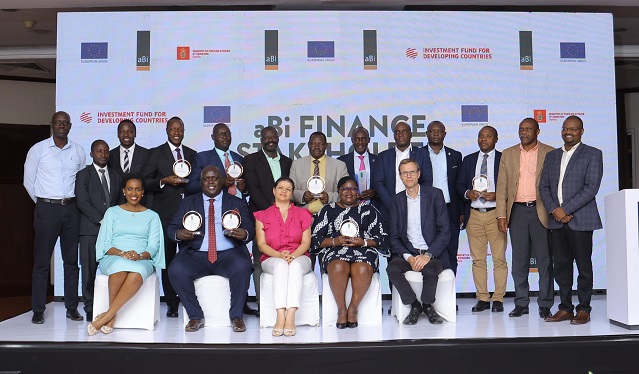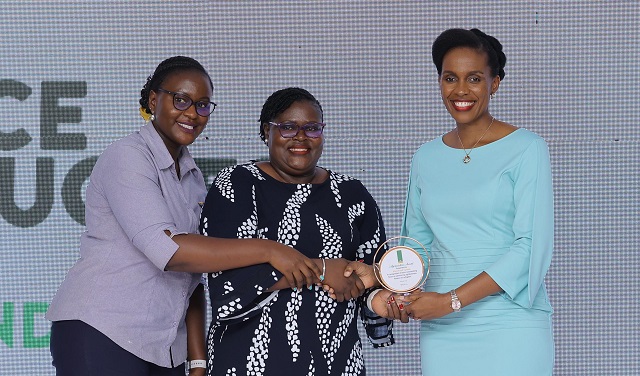
aBi Finance intensifies commitment on Green Inclusive Finance to empower smallholder farmers and promote a sustainable agribusiness sector in Uganda
Kampala, Uganda | THE INDEPENDENT | aBi Finance Ltd, a leading wholesale impact investment company, hosted a pivotal Stakeholder Engagement Forum to recognize the achievements of its financial partners and outline ambitious goals for sustainable, inclusive growth in Uganda’s agricultural sector. The event ran under the theme, “Accelerating Adoption of Green Inclusive Finance for Climate Change Adaptation, Mitigation, and Biodiversity Conservation (AAGIF).
aBi Finance has been at the forefront of deploying funds to foster resilience against climate change through climate change adaptation, wealth creation, employment, and economic growth for smallholder farmers and agribusinesses. Working alongside actors in the financial services sector, aBi Finance utilizes a mix of financial instruments to strengthen financial institutions’ ability to provide credit to smallholder farmers and agribusinesses. These interventions are guided by Environmental Social and Governance (ESG) principles, ensuring an inclusive focus on Planet, People and Profits to promote long-term sustainability.
Between 2022 and 2024, aBi Finance has implemented several green finance interventions which include the following; In partnership with the Global Green Growth Institute (GGGI) developed the green agribusiness taxonomy to enable financial institutions classify green investments with they are financing. This was followed by the development and distribution of green Information, Education and Communication (IEC) materials to 1,000 branches of 52 partner financial institutions. aBi Finance developed or updated environmental policies and green loan products for 40 partner financial institutions.
Other interventions implemented are; the enhancement of Management Information Systems (MIS) of 27 financial institutions to report green loans, development of the ESG framework for Tiers 1,2 and 3 financial institutions in partnership with the Bank of Uganda (BoU) and Uganda Bankers Association (UBA). aBi Finance is currently working on developing the ESG framework for Tier 4 financial institutions in partnership with Uganda Microfinance Regulatory Authority (UMRA), Uganda Cooperative Savings and Credit Union Limited (UCSCU), the Association of Microfinance Institutions of Uganda (AMFIU), The Financial Technologies Service Providers Association (FITSPA). aBi Finance is also partnering with The Uganda Institute of Banking and Financial Services (UIBFS) to develop a curriculum to enable broad-based learning about Green finance, ESG, Sustainability in the Uganda context.

In line with its strategic focus, aBi Finance recently launched a new business plan for 2024- 2028, setting ambitious targets aimed at promoting climate resilience and economic empowerment for Uganda’s smallholder farmers and agribusinesses. Through this plan, the company seeks to reach 83,000 smallholder farmers with at least 40% of beneficiaries are expected to be women, and 40% youth.
As a vital sector in Uganda’s economy, agriculture supports millions of households, especially in rural areas, making sustainable investment essential to climate resilience and economic growth.
According to the Ministry of Agriculture, Animal Industry and Fisheries (MAAF), Agriculture sector performance from FY 2018/19 – 2022/23 reported that the gross value added for agriculture, forestry and fishing sector was Ushs. 43 billion in FY 2022/23 compared to Ushs. 39 billion registered in FY 2021/22, reflecting a 12.5% increase. The Agricultural sector had a contribution of 23.8% to Gross Domestic Product in FY 2022/23 compared to 24.1% in FY 2021/22.
“In green financing, we are looking to focus particularly on climate change adaptation that will support beneficiaries to be resilient to the shocks that are being brought about by climate change. We will not forget and we will continue to target underserved regions in Northern, Eastern Ugandan, underserved demographics, women, youth, and refugees. They remain a core for us as they have been over the last 14 years.” Mrs. Ssebuliba added.
Since launching the new business plan in May, aBi Finance has already disbursed over Ushs. 30 billion in green finance to 20 partner financial institutions. These institutions have in turn lent it out to smallholder farmers and agribusiness deploying over 90% of it in climate change adaptation investments. aBi Finance aims to increase its portfolio of green finance from the current 15% to at least 75% by 2028.
aBi Finance continues to champion green inclusive finance interventions that support Uganda’s vision of a competitive, profitable, and sustainable agricultural sector, which is critical to the country’s broader development goals under Vision 2040.
 The Independent Uganda: You get the Truth we Pay the Price
The Independent Uganda: You get the Truth we Pay the Price



